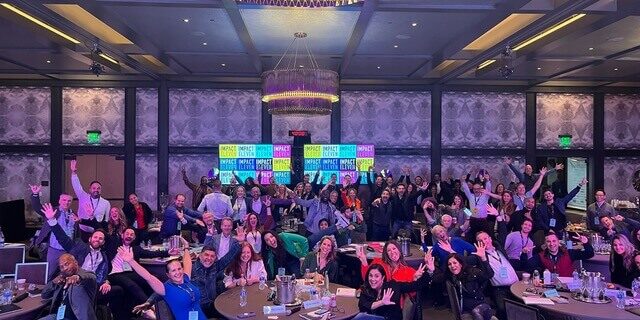“As Aristotle said, ‘Excellence is not an act, but a habit.’ We’re establishing the habit of excellence.” ~ Chris Reynolds, CEO of Investment Planning Counsel
I settled into the last row in the Vancouver Convention Center. It was approaching 8 am and the 19th annual Investment Planning Counsel conference was about to kick off. I was giving the closing presentation on day one so I had carved out most of the day to attend the event, learn from the other speakers and prep for my talk.
CEO Chris Reynolds took the stage first and 60 minutes later I had 5 pages of notes and 3 actionable ideas to help improve my business! I am always interested in the opportunity to listen to a successful entrepreneur and learn about his journey. Chris didn’t disappoint. In fact, he gave a passionate presentation about why the business exists, why the work matters, the very BIG opportunity they plan to capture and precisely how they intend to capture it. You could feel the energy elevate in the room around where this business is going. I was particularly moved by his absolute obsession with creating a world-class customer experience and the roadmap they use to deliver. I caught up with him after the conference to dive a little deeper .
Total Client Experience
IPC launched in 1994. When Chris started the company, his goal was to help financial advisers create a better business. He realized that what’s most important for financial advisers is the client experience — their relationships with the people they serve. “Everybody needs what financial advisers provide,” he says. “People need advice. They don’t need robots. They don’t need programs. They need relationships. They need people who care.”
As financial advice becomes a commodity and with the category facing unprecedented technological disruption, Chris leaned into the opportunity everyone in the room has to differentiate, go deeper with the right clients and ultimately win big. To help advisers develop those relationships and expand their opportunities, IPC embraces a system they call TCE: Total Client Experience.
To create TCE, the team looked at how best-in-class advisers were managing every aspect of the client experience:
- What do their offices look like?
- What kind of questions do they ask new clients?
- What kinds of recommendations do they offer?
- How do they make their services as simple and clear as possible?
- How do they avoid the common financial services trap of over-complicating concepts?
- How often do they review their recommendations and progress with clients?
- How do they create a compelling message about who they are and what they do?
- What makes an adviser world-class and differentiated from the hundreds of other options on the market?
From those answers about creating a world-class client experience, TCE was born.
“Everything we do for advisers is focused on: How do we help them build a better business?” Chris says. “Clients aren’t just numbers. Relationships are everything in this business. We help advisers simplify their offerings so they can focus on those relationships.”
Every touch with a customer represents an opportunity to add value and advance a relationship. Auditing and subsequently elevating every touch point with a customer for maximum impact is sound advice for any business. When those experiences resonate deeply with customers and you can deliver them consistently, you have a winning formula.
Advisers leveraging TCE have seen four times the growth in their business compared with advisers who aren’t following the TCE system. The days when financial advisors charged 1% for basic portfolio construction and little else are coming to an end. Clients expect a whole lot more. Advisors today are being challenged to provide more holistic wealth management services addressing more complex issues beyond just investments. Having a system in place to deliver a comprehensive, world-class experience for customers is helping advisers respond to the challenge, change and opportunity in the marketplace.
Creating a Roadmap to Success
Here’s what one IPC adviser says about the impact of the Total Client Experience program on his business:
“With the Total Client Experience, we know exactly which client interaction is required and when, based on where the client is in the planning process. In addition to helping our team, this also ensures our clients get the most from each interaction and also that they know where they stand in the process. Consistency is the other big advantage of TCE. Delivering consistent messaging makes it easy for clients to understand our unique process and to explain it to others. Already, we are receiving referrals as a result of TCE.” ~ Colin Corner, Brantford, ON.
The beauty of this program is that it’s a simple roadmap to more successful client partnerships and ultimately a better practice.
Here are just a few of the details that the program defines:
- How to set up an initial client meeting.
- A one-pager to send clients before the meeting, including a map to get to the office and a list of what they need to bring.
- A refreshment menu to offer when they arrive at the office.
- Guides and paperwork for the first appointment.
- Specific follow-up plans, including phone scripts, letter templates and guides for every possible course of action the client might want to take.
- A detailed cash flow analysis.
- A tax planning review meeting agenda.
- A financial planning checklist to help clients monitor their financial health.
IPC has taken years of collective knowledge and best practices to create a process that any adviser can follow to deliver impact down to the last detail.
Less But Better
Chris also clearly demonstrated that practice growth doesn’t necessarily mean more clients. It most certainly does mean going deep with the right kind of clients. That requires ongoing analysis in your practice and developing a very clear picture of the ideal client profile.
During the day we heard some compelling adviser case studies of profitable growth achieved through some careful analysis and ultimately culling of the client roster to free time for focus on the right kind of relationships.
That makes a whole lot of sense. It also takes a little courage and discipline. I was paying close attention. Instead of taking on more clients, his strategy puts an emphasis on quality relationships with the right clients.
Culture Eats Strategy for Breakfast
Chris also shared that his guiding principle is a simple one: Culture trumps strategy. “Strategy without culture is never effective,” he says. “Culture comes down to basic communication: What do you stand for?”
At times, the company’s rapid growth has caused culture challenges, but the team gets back on track by remembering their simple guiding ideas. “It’s a matter of getting back to perspective. We exist for our people. Our organization is a family,” Chris says. “Money will come if you have the culture.”
As CEO, one of the ways Chris stays on track is through working with a business coach. “Every world-class athlete, singer and actor has a coach who helps them get better,” he says. He’s applied the same concept to running a business. He’s had a business coach for close to 15 years, and meets with him every two weeks.
“I like the saying, ‘When you’re self-employed, you work for a maniac,’” he says. “My coach brings me accountability and focus, and it’s worth every penny I pay him.”
I learned more than I could have hoped from Chris’ entrepreneurial and leadership journey. My takeaway for other leaders who are facing major industry change: Obsess about customer experience. Focus on building relationships with the right customers. Put your people first. Simple advice that creates powerful results.








![[RYAN] Featured_Why Human-Centered Leadership Is the Future of Growth [RYAN] Featured_Why Human-Centered Leadership Is the Future of Growth](https://ryanestis.com/wp-content/uploads/bb-plugin/cache/RYAN-Featured_Why-Human-Centered-Leadership-Is-the-Future-of-Growth-1024x538-panorama-78e9dc1762c564216c0e9d2780c005b1-.jpg)

